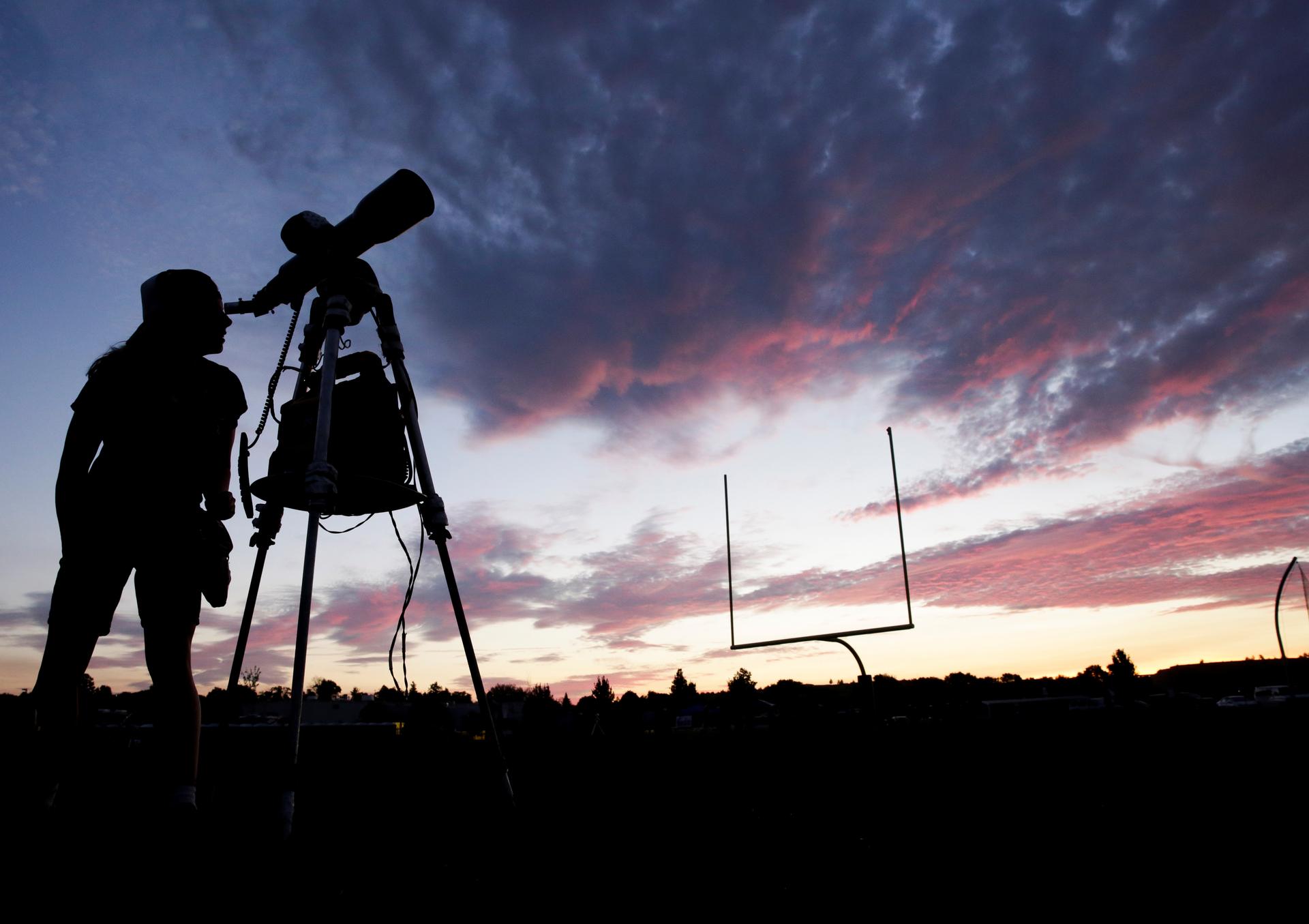Watch: NASA streamed the Great American Eclipse
A woman looks through a telescope on the football field at Madras High School the evening before a solar eclipse in Madras, Oregon, Aug. 20, 2017.
Millions of sky-gazers staked out viewing spots across the United States Monday to see the sun briefly disappear behind the moon, in the first total solar eclipse in 99 years to cast a shadow on the entire continent.
Eclipse chasers and amateur star watchers alike converged in cities along the so-called path of totality for what has been coined "The Great American Eclipse," which began in the morning over Oregon and exits in the afternoon over South Carolina.
Festivals, rooftop parties, weddings, camping and kayak trips and astronomy meet-ups popped up nationwide for what NASA expected to be the most heavily photographed and documented eclipse in modern times, thanks to the era of social media.
You can watch NASA's coverage of the eclipse here:
oembed://https%3A//www.youtube.com/watch%3Fv%3DwwMDvPCGeE0
More than 100,000 people have gathered in Madras, Oregon, typically a town of 7,000 that is one of the first places to see the eclipse once it begins. The National Guard had to be called in to assist with traffic jams.
In downtown Charleston, one cafe served breakfast sandwiches and cocktails to a full house as crowds of tourists — some in star-printed trousers — made their way to the bustling East Coast city's storied waterfront to stake out a prime spot.
One bar had installed outdoor speakers which blasted Bonnie Tyler's mega-hit "Total Eclipse of the Heart" — which she will sing on a cruise ship on Monday.
Related: You’re hiking, biking and kayaking your way to the Great American Eclipse
Vendor Jan Dahouas sold T-shirts emblazoned with "Eclipse 2017" and buttons that read "Keep Calm and Stare at the Sun" ahead of the main event.
"I am really pumped up about it," said Dahouas, who is from Atlanta, Georgia.
"I hear it is supposed to be really moving."
Many people who have seen eclipses in the past describe the experience as an emotional one, as the sky goes black, birds return to their nests and the air chills.
"It is such an incredible, sensory-overload kind of event," eclipse-chaser Fred Espenak told AFP of the first total solar eclipse he saw in the United States back in 1970.
Espenak, now 65, is a retired NASA astrophysicist who has been to 27 eclipses, and seen 20 of them — cloudy weather interfered with the rest. He will be in Wyoming on Monday.
The "total" part of the eclipse, when the moon moves between the Earth and sun and blocks all of the sun's light, starts at 10:16 a.m. local time over the Pacific coast of Oregon and ends about 90 minutes later over Charleston.
'We're ready!'
The total eclipse carved a 70-mile-wide path of darkness over 14 states.
Experts warn that looking directly at an eclipse can cause permanent eye damage.
"The damage can really be permanent and right smack in the center of their vision," said Vincent Jerome Giovinazzo, director of ophthalmology at Staten Island University Hospital, Northwell Health.
The only safe time to look at it is for those within the path of totality — and only during the brief moments when the sun is completely blocked.
Everyone else should use proper solar eyeglasses, which are far darker than regular ones, or make a pinhole projector to see the eclipse while avoiding the glare of the sun.
Cloudy weather and thunderstorms threatened to dash viewers' hopes in some places, including Charleston.
Some of the clearest views were expected along the West Coast and in the Midwest.
Scientists plan to study the eclipse to learn more about the super-hot corona, or outer edge of the sun.
Astronauts orbiting the Earth aboard the International Space Station are also planning to document the eclipse, and will get to see it three times.
"My first solar eclipse from space … We're ready!" wrote Italian astronaut Paolo Nespoli.
